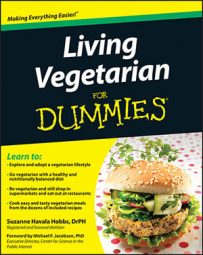If you’re considering a vegetarian lifestyle, get individualized advice from a registered dietitian who’s knowledgeable about vegetarian diets. And whether vegetarianism is new to you or you’ve been meat-free for years, keep these general guidelines in mind:
Eat a variety of foods, including fruits, vegetables, legumes, seeds, and nuts, and get enough calories to meet your energy needs.
Eat plenty of calcium-rich foods, such as broccoli, collards, kale, fortified orange juice, nonfat cow’s milk or fortified soy or rice milk, almond butter, or sesame tahini.
Include daily servings of n-3 fats, such as flaxseed, soybean or canola oils, walnuts, or ground flaxseeds.
Get enough vitamin D through sun exposure, eating fortified foods, or taking a supplement.
Include daily servings of vitamin B12 from such sources as Red Star Vegetarian Support Formula nutritional yeast, fortified soy or rice milk, nonfat cow’s milk or yogurt, fortified breakfast cereals, or a B12 supplement.
Limit sweets and alcohol to ensure that you have enough room in your diet for foods containing essential nutrients.

